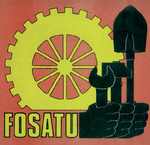Federation of South African Trade Unions
The Federation of South African Trade Unions (FOSATU) was a trade union federation formed at a congress over the weekend of 14–15 April 1979 in Hammanskraal and officially launched five days later on 20 April.[1][2] Its roots lay in the unions which had emerged from the spontaneous 1973 strike wave by black workers in Durban and Pinetown (part of the "Durban Moment").[3]
 | |
| Full name | Federation of South African Trade Unions |
|---|---|
| Founded | 20 April 1979 |
| Date dissolved | 1 December 1985 |
| Merged into | COSATU |
| Country | South Africa |
FOSATU's constitution enshrined the principles of workers' control of their trade unions, non-racialism, worker independence from party politics, international worker solidarity and trade union unity. It strove to build a tight national federation to work towards an industrial workers' bloc firmly based in strong grassroots organisation on the factory floor.[4] It became the first truly national non-racial trade union federation in South African history, building unity and avoiding the regionalism which had pervaded earlier attempts at such an organisation. Its success here has been attributed to the fostering of a national leadership layer of "organic intellectuals" through a strong focus on the political education of shop stewards, and tight integration of the national, provincial and local structures of the organisation.[5]
As part of its commitment to trade union unity, FOSATU was prepared to disband its structures if wider unity could be attained.[3] On 1 December 1985, following four years of unity talks between competing trade union federations, FOSATU upheld this pledge by dissolving into the newly formed Congress of South African Trade Unions (COSATU).[6][7]
See also
- Industrial and Commercial Workers' Union
- Internal resistance to South African apartheid
- Trade unions in South Africa
References
- Friedman, Michelle (2010). "The Future is in the Hands of the Workers": A History of FOSATU (PDF). Johannesburg: Mutloatse Heritage Trust. p. 14–18. ISBN 978-09869833-1-3. Retrieved 13 July 2013.
- South African History Online. "The Federation of South African Trade Unions is founded". www.sahistory.org.za. Archived from the original on 24 February 2013. Retrieved 15 July 2013.
- Friedman, Michelle (2010). "The Future is in the Hands of the Workers": A History of FOSATU (PDF). Johannesburg: Mutloatse Heritage Trust. p. 18–23. ISBN 978-09869833-1-3. Retrieved 13 July 2013.
- Friedman, Michelle (2010). "The Future is in the Hands of the Workers": A History of FOSATU (PDF). Johannesburg: Mutloatse Heritage Trust. p. 34. ISBN 978-09869833-1-3. Retrieved 15 July 2013.
- Friedman, Michelle (2010). "The Future is in the Hands of the Workers": A History of FOSATU (PDF). Johannesburg: Mutloatse Heritage Trust. p. 14. ISBN 978-09869833-1-3. Retrieved 15 July 2013.
- South African History Online. "Congress of South African Trade Unions (COSATU)". www.sahistory.org.za. Retrieved 15 July 2013.
- COSATU. "Brief History of COSATU". www.cosatu.org.za. Archived from the original on 27 June 2018. Retrieved 15 July 2013.